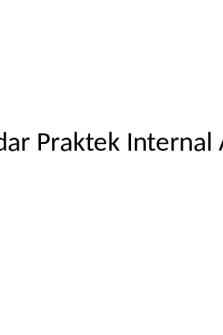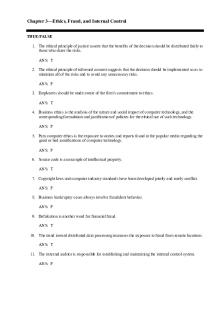Fraud and Internal Audit PDF

| Title | Fraud and Internal Audit |
|---|---|
| Course | Bachelor of Science in Accountancy |
| Institution | Polytechnic University of the Philippines |
| Pages | 4 |
| File Size | 231.2 KB |
| File Type | |
| Total Downloads | 57 |
| Total Views | 139 |
Summary
jHZITSsigbvbjxbiGGS IsgigOB KXVUt lhcpugx lousx hdgix hsis klshohx lhnxlanxn...
Description
IIA POSITION PAPER
FRAUD AND INTERNAL AUDIT Assurance Over Fraud Controls Fundamental to Success
Introduction
KEY TAKEAWAYS
Every year billions of dollars are lost to fraud and corruption resulting in inefficiencies, aborted projects, financial challenges, organizational failure, and, in extreme cases, humanitarian disaster. Often fraud occurs because of poorly
Organizations should have
designed controls and weak governance undermining the organization’s processes.
robust internal control procedures to limit the risk of fraud, and internal audit’s role is
Organizations should have robust internal control procedures to limit the risk of fraud, and internal audit’s role is to assess these controls.
to assess these controls.
Fundamental Fraud Facts
The organization should have a
Fraud can be defined as any illegal act characterized by deceit, concealment, or violation of trust. These acts are not dependent upon the threat of violence or physical force. Frauds are perpetrated by parties and organizations to obtain money, property, or services; to avoid payment or loss of services; or to secure personal or business advantage.
suitable fraud prevention and response plan in place allowing effective limitation and swift response to the identification of fraud and management of the situation. This should include digital data.
Fraud is not unique to any organization type. It occurs in public and privately owned businesses, not-for-profit, in organizations that seek to contribute to economic and social well-being, such as government departments, financial institutions, and public and private utilities (water, electricity, education, health
The chief audit executive should consider how the risk of fraud is
care, etc.). In short, the opportunity to commit fraud exists everywhere.
managed across the organization and assess the fraud risk exposure periodically.
How organizations deal with the risk of fraud may be influenced by legal jurisdiction and the organization’s own risk assessment and appetite. Fraud can often lead to litigation, dismissal, and recovery of assets. It is essential, therefore, that any investigation is undertaken by suitably qualified individuals to reduce the risk of compromising evidence, accusing wrongfully, or undermining prospective legal actions.
The risk of fraud should be included in the audit plan and each audit assignment to evaluate the adequacy of anti-fraud controls.
Consistent with The IIA’s International Standards for the Professional Practice of Internal Auditing on proficiency (1210.A2), internal auditors must have sufficient knowledge to evaluate the risk of fraud and the manner in which it is managed by the organization.
1
Internal auditors should not investigate fraud unless they have the specific experience and expertise required to do so.
The IIA’s Perspective Internal auditing is an independent, objective assurance and consulting
FIVE QUESTIONS
activity designed to add value and improve an organization's operations. Its role includes detecting, preventing, and monitoring fraud risks and addressing those risks in audits and investigations.
Managing fraud risk is something every organization faces. Governing bodies and executive
It should consider where fraud risk is present within the business and respond
management can help clarify roles in fraud risk management,
appropriately by auditing the controls of that area, evaluating the potential for the occurrence of fraud and how the organization manages fraud risk
including internal audit’s role.
(Standard 2120.A2) through risk assessment, and audit planning. It is not internal audit’s direct responsibility to prevent fraud happening within the business. This is
Here are five key questions the
the responsibility of management as the first line of defense.
governing body should be asking:
The internal auditor should not be expected to have the expertise of a person
1.
whose primary responsibility is to investigate fraud. Such investigations are best carried out by those experienced to undertake such assignments.
Does the organization have a fraud response plan in place that
Internal audit should use its expertise to analyze data sets to identify trends and
outlines key policies and investigation methodologies?
patterns that might suggest fraud and funding abuse. Where the experience is not available within the internal audit team, the organization should consider recruiting
2.
or engaging resources with sufficient knowledge or expertise.
Who carries out fraud
The organization should have a suitable anti-fraud response plan outlining key
investigations within the organization?
policies and investigation methodologies. The plan should make clear the role of internal audit when there is suspected fraud and associated control failure.
3. Is internal audit tasked with
Operationally, internal audit should have sufficient knowledge of fraud to:
identifying where fraud risk is present, and does it audit
Identify red flags indicating fraud may have been committed.
controls in these areas?
Understand the characteristics of fraud and the techniques used to commit
4.
fraud, and the various fraud schemes and scenarios.
When fraud has occurred, does internal audit investigate
Evaluate the indicators of fraud and decide whether further action is
Evaluate the effectiveness of controls to prevent or detect fraud.
necessary or whether an investigation should be recommended.
Where electronic evidence is collected, internal audit should provide assurance on whether necessary access rights and legislative requirements are being met. Where fraud has occurred, internal audit should understand how the controls failed and identify opportunities for improvement. It should consider the probability of further errors, fraud, or noncompliance across the organization and reassess the cost of assurance in relation to potential benefits. Many factors, including available resources, influence how organizations respond to fraud. Some organizations include fraud awareness (proactive) and response (reactive) mechanisms within the internal audit activity, and some internal auditors may investigate fraud.
2
to understand how the controls failed and how they can be improved?
5. Is internal audit tasked to investigate fraud, and, if so, does it possess the proper skill sets to carry out such investigations?
If internal audit is required to investigate fraud, the internal auditor should have the necessary skills and experience to undertake the investigation and discharge their professional responsibility without jeopardizing the investigation and
Organizations should not
associated evidence.
expect internal audit’s skill
Investigation is not typically an internal audit task; therefore, internal auditors should exercise due professional care (Standard 1220) by considering the extent of work needed to achieve the engagement’s objectives and the related complexity, materiality, or significance. They should decide if they are best placed
set to include fraud investigation. Instead, internal audit should support the organization’s anti-fraud
to undertake the investigation or whether to engage internal legal counsel, human resources, qualified or certified fraud examiners, digital forensics, or outside legal
management efforts by
and investigative expertise.
providing necessary assurance services over
Conclusion The threat of fraud is one of the most common challenges to governance that organizations face without regard to size, industry, or location. Having
internal controls designed to detect and prevent fraud.
proper internal control procedures in place that include an appropriate response plan is fundamental to battling fraud. Internal audit possesses intimate control knowledge of the organization. A combined assurance approach is key in this regard to understand the gaps in controls to allow for the manifestation of fraud. Fraud investigations are best carried out by those experienced to undertake such assignments. Organizations should not expect internal audit’s skill set to include fraud investigation. Instead, internal audit should support the organization’s anti-fraud management efforts by providing necessary assurance services over internal controls designed to detect and prevent fraud. If circumstances require internal audit to take on an investigatory role, internal auditors should exercise due professional care.
3
About Position Papers The IIA promulgates Position Papers on key issues of interest to stakeholders and practitioners with the aim of advocatingrfo sound governance and educating those involved in it. The positions outlined offer insights into various aspects fothe governance process and internal audit’s vital role in improving governance at all levels and adding value to the organization. Position Papers are developed and reviewed through a rigorous process that solic its input and critique from practicing internal audit professionals and other IIA volunteers who serve on The IIA’s Global Advocacy Committee, IIA Standards Board, and The IIA’s Professional Responsibility and Ethics Committee.
About The IIA The IIA is the internal audit profession’s most widely ecognized r advocate, educator, and provider of standards, guidance, and certifications. Established in 1941, The IIA today serves more than 190,000 members from more than 170 countries and territories. The IIA’s global headquarters earin Lake Mary, Fla. For more information, visit www.globaliia.org.
Disclaimer The IIA publishes this document for informational and educational purposes. This material is not intended to provide definiti ve answers to specific individual circumstances and as such is only intended to be used as a guide. The IIA recommends seeking independent expert advice relating directly to any specific situation. The IIA accepts no responsibility for anyone placing sole reliance on this material.
Copyright Copyright © 2019 by The Institute of Internal Auditors, Inc. All rights reserved. January 2019
Global Headquarters The Institute of Internal Auditors 1035 Greenwood Blvd., Suite 401 Lake Mary, FL 32746, USA Phone: +1-407-937-1111 Fax: +1-407-937-1101 www.globaliia.org
4...
Similar Free PDFs

Fraud and Internal Audit
- 4 Pages

audit fraud
- 5 Pages

INTERNAL AUDIT
- 209 Pages

Contoh kasus internal audit
- 9 Pages

Audit internal control
- 5 Pages

LAPORAN AUDIT INTERNAL
- 18 Pages

PPT Audit Pengendalian Internal
- 13 Pages

LAPORAN AUDIT INTERNAL
- 6 Pages

Standar Praktek Internal Audit
- 15 Pages

Internal Audit ch 26
- 5 Pages

SURVEI PENDAHULUAN ( INTERNAL AUDIT)
- 10 Pages

Internal audit - Chapter 5
- 4 Pages
Popular Institutions
- Tinajero National High School - Annex
- Politeknik Caltex Riau
- Yokohama City University
- SGT University
- University of Al-Qadisiyah
- Divine Word College of Vigan
- Techniek College Rotterdam
- Universidade de Santiago
- Universiti Teknologi MARA Cawangan Johor Kampus Pasir Gudang
- Poltekkes Kemenkes Yogyakarta
- Baguio City National High School
- Colegio san marcos
- preparatoria uno
- Centro de Bachillerato Tecnológico Industrial y de Servicios No. 107
- Dalian Maritime University
- Quang Trung Secondary School
- Colegio Tecnológico en Informática
- Corporación Regional de Educación Superior
- Grupo CEDVA
- Dar Al Uloom University
- Centro de Estudios Preuniversitarios de la Universidad Nacional de Ingeniería
- 上智大学
- Aakash International School, Nuna Majara
- San Felipe Neri Catholic School
- Kang Chiao International School - New Taipei City
- Misamis Occidental National High School
- Institución Educativa Escuela Normal Juan Ladrilleros
- Kolehiyo ng Pantukan
- Batanes State College
- Instituto Continental
- Sekolah Menengah Kejuruan Kesehatan Kaltara (Tarakan)
- Colegio de La Inmaculada Concepcion - Cebu



